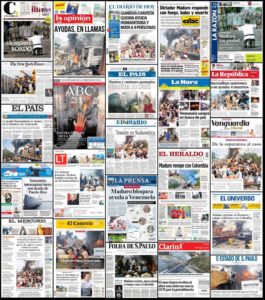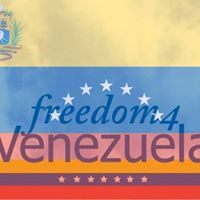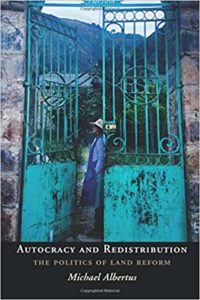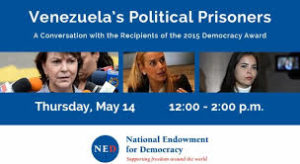Opposition leader Juan Guaido, who declared himself interim president of Venezuela in January, said he will return to the country “despite the risks.” Guaido defied a court travel ban last week by traveling to Colombia, Reuters reports (HT:CFR) to assist international efforts to deliver humanitarian aid to Venezuelans.
U.S. special envoy Elliott Abrams said Washington will soon announce new U.S. sanctions (VOA) on high-ranking officials in President Nicolas Maduro’s regime, as well as individuals who handle their finances.

Moises Naim/Twitter
A solution to the crisis requires greater international engagement, which includes pressure on Cuba, analyst Moisés Naím [a former National Endowment for Democracy board member] said Monday. The Communist regime in Havana has been able to plunder Venezuela for many years without consequences.
U.S. Sen. Marco Rubio, a fierce critic of Maduro, warned Tuesday that tyrants often believe they’re invulnerable — his first, indirect reference to his own cryptic tweeted images over the weekend showing dictators during their brutal downfalls, the Washington Post adds.
The potential collapse of Maduro’s regime poses a threat to Cuba, which relies on Caracas for about 28% of the island’s oil needs. Venezuela’s opposition says the government’s longstanding oil-barter agreement with Cuba is irrational, coming amid an economic free fall at home, and benefits a Communist dictatorship it reviles, the Wall Street Journal adds:.
 If Guaidó, who is recognized by the U.S. and about 50 other countries as Venezuela’s legitimate head of state, wrests control of the country from Maduro, his government is expected to quickly halt the oil shipments. The result would be power outages, fuel shortages and government spending cuts that would cause the Cuban economy to shrink by as much as 10%, according to Omar Everleny Perez, an independent Cuban economist in Havana.
If Guaidó, who is recognized by the U.S. and about 50 other countries as Venezuela’s legitimate head of state, wrests control of the country from Maduro, his government is expected to quickly halt the oil shipments. The result would be power outages, fuel shortages and government spending cuts that would cause the Cuban economy to shrink by as much as 10%, according to Omar Everleny Perez, an independent Cuban economist in Havana.
Ted Henken, a Cuba expert at Baruch College in New York, said the end of bargain-basement-priced oil for Cuba would cause a seismic shift on the island. “Cuba has limped along for the past 15 years thanks, basically, to the relationship with Venezuela,” he said.
Maduro still has the loyalty of senior officers, whom his administration has courted with promotions and lucrative contracts, the New York Times adds. But the embarrassment of having scores of low- and middle-ranking security forces defect to the other side was not without political repercussions, said David Smilde, a sociologist who studies Venezuela at Tulane University.
“We haven’t seen images like that since the fall of communism,” Mr. Smilde said. “It makes it clear how much fear there is among soldiers and security agents who feel that they now have to flip and come across the border.”
 Lessons from other transitions to democracy around the world can shed light on how such an agreement could be forged in Venezuela, notes Michael Albertus, an associate professor of Political Science at the University of Chicago, and author of Autocracy and Redistribution: The Politics of Land Reform. The best shot for democracy is for the mainstream opposition to bring along the moderate elements of the Chavismo movement while leaving out Maduro in a way that will be stable while also delivering enough justice to satisfy the population as a whole, he writes for Foreign Policy:
Lessons from other transitions to democracy around the world can shed light on how such an agreement could be forged in Venezuela, notes Michael Albertus, an associate professor of Political Science at the University of Chicago, and author of Autocracy and Redistribution: The Politics of Land Reform. The best shot for democracy is for the mainstream opposition to bring along the moderate elements of the Chavismo movement while leaving out Maduro in a way that will be stable while also delivering enough justice to satisfy the population as a whole, he writes for Foreign Policy:
- First, Venezuela’s notoriously divided opposition must stay united while also sidelining its most extreme elements, who advocate regime change by any means necessary followed by the severe prosecution of the PSUV. Many citizens have suffered from hunger, persecution, and declining living standards under Maduro and have every reason to want to destroy Chavismo and prosecute its leading figures and allies…. Although the Venezuelan opposition has no Nelson Mandela, its current leadership should heed Mandela’s example. When Mandela went from being a political prisoner to the president of post-apartheid South Africa over the course of four years, he taught that democracy requires patience…
- Second, the military has to be persuaded to support the transition and either topple Maduro or force him to capitulate. To do so, amnesty protections are not enough. Since former President Hugo Chávez took power, the Venezuelan military has become deeply involved in a wide range of profitable economic activities. … Consider Chile’s transition to democracy in 1989. As part of the deal, the top military brass were given constitutionally protected amnesties, direct positions in the Chilean Senate, a majority position on the National Security Council, constitutional oversight, and 10 percent of the country’s copper revenues delivered directly to the military’s budget—an enormous sum given Chile’s mineral-reliant economy.
 Third, key elements of the ruling PSUV have to be convinced that the status quo is unsustainable and that they could compete and even win political office in a democratic system. The PSUV still has a strong organizational base around the country. Together with its predecessor, the Fifth Republic Movement, it has long organized civilian groups and won offices at the mayoral, gubernatorial, and national levels in elections that were largely free and fair through the 2000s, and competitive but biased ever since. And many of its core principles—national ownership of major resources, social and economic equality, and popular participation in governance—remain widely popular. This puts it in a comparatively strong position relative to a party like the ruling National Party that handed over power to end apartheid in South Africa…..
Third, key elements of the ruling PSUV have to be convinced that the status quo is unsustainable and that they could compete and even win political office in a democratic system. The PSUV still has a strong organizational base around the country. Together with its predecessor, the Fifth Republic Movement, it has long organized civilian groups and won offices at the mayoral, gubernatorial, and national levels in elections that were largely free and fair through the 2000s, and competitive but biased ever since. And many of its core principles—national ownership of major resources, social and economic equality, and popular participation in governance—remain widely popular. This puts it in a comparatively strong position relative to a party like the ruling National Party that handed over power to end apartheid in South Africa…..- Fourth, the opposition and moderate PSUV elements have to agree upon a transitional government with power-sharing elements following national elections. Given the PSUV’s recent record under Maduro, it will expect to be steamrolled if national elections are held. It may therefore fear being permanently politically buried. To alleviate these fears, it needs a chance to help rehabilitate its reputation by taking a part in the governance of recovery. South Africa is a useful model here. …
- Finally, the opposition needs to appeal to citizens as a whole to play a bigger role in the country’s future. While the opposition needs to be cautious and inclusive in the short term, democracy can only succeed in the long run if it comes to truly represent the will of the Venezuelan people. This means revisiting core elements of the transition deal years in the future. RTWT
Moises Rendon, associate director & associate fellow of CSIS Americas Program, testifies (above) before the House Committee on Foreign Affairs Subcommittee on the Western Hemisphere, Civilian Security, and Trade on “Made by Maduro: The Humanitarian Crisis in Venezuela and U.S. Policy Responses.”







